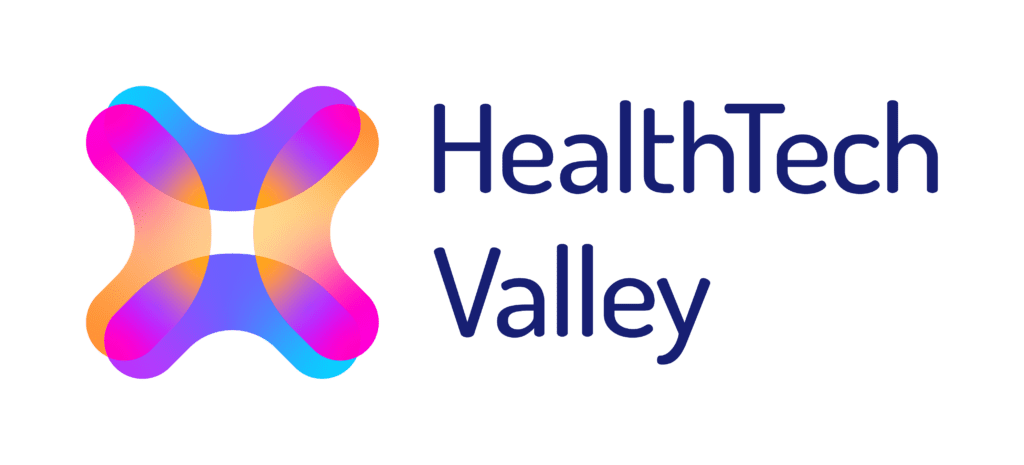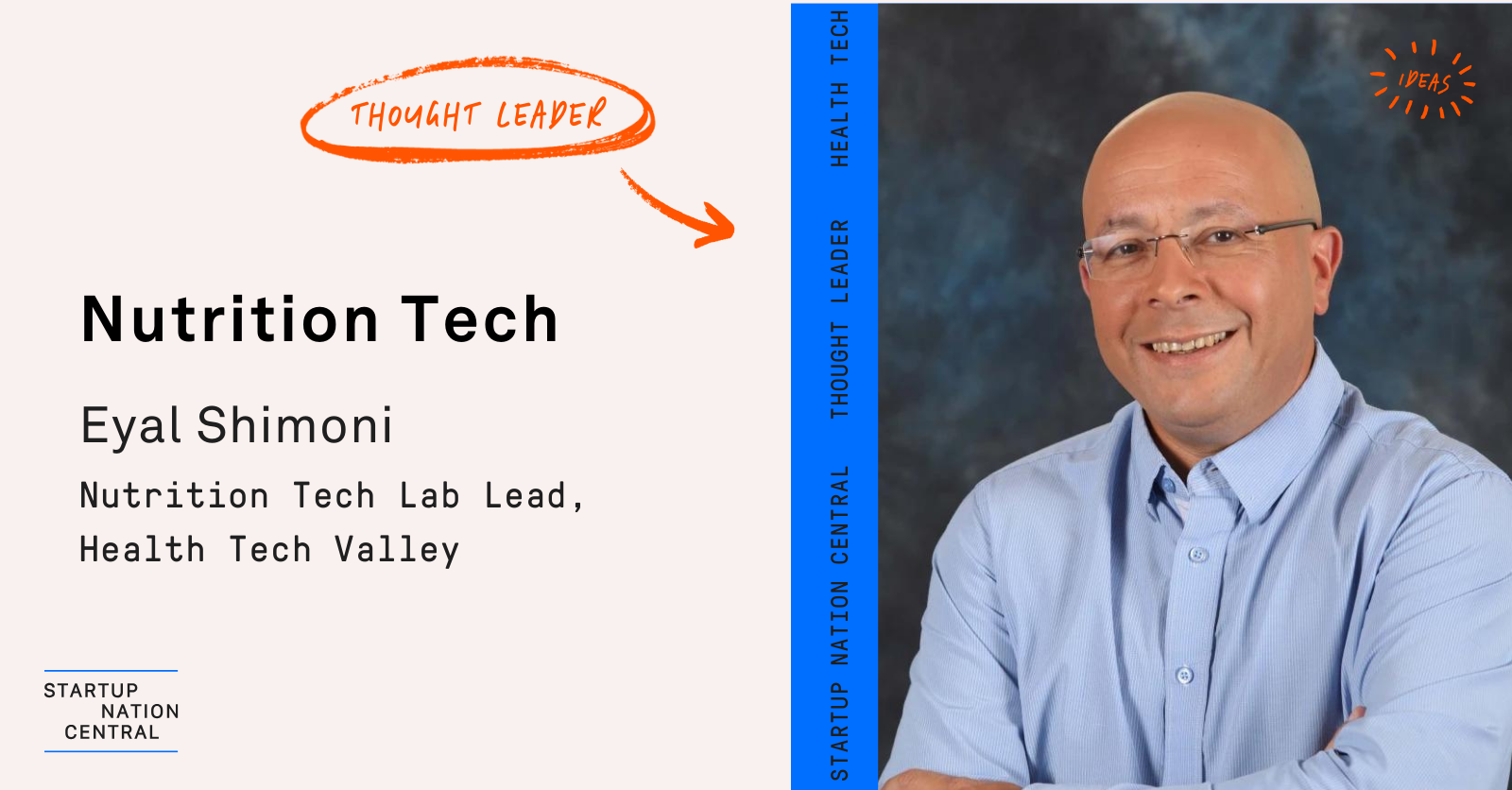By Eyal Shimoni
As a senior research fellow at the Samuel Neaman Institute and a scientific and tech advisor, Eyal Shimoni brings a wealth of knowledge and a unique perspective to the Nutrition Tech landscape. A board member and head of the Nutrition Tech initiative at Health Tech Valley, Eyal is pioneering the integration of data-driven solutions into nutritional science and healthcare. Eyal is also a writer and ultra-marathon runner.

Nutrition Tech is emerging at the intersection of healthcare, technology, and nutrition, aiming to revolutionize how we understand and manage our health through diet and lifestyle. This sector is harnessing the power of technology, data analytics, and personalized approaches to foster a healthier society, making Nutrition Tech a pivotal element in the future of health and wellness.
There is a clear continuum between diet, physical activity, and health, whether it is for maintaining good health, treating a specific illness, or recovering from a disease or medical procedure. This continuum is where we have the opportunity to nurture solutions based on data sharing, the convergence of technologies, and tailoring solutions for populations and individuals (personalized medicine and nutrition).
Overall, Nutrition Tech and Health Tech are connected through their shared goal of promoting well-being, longevity, and healthy lifestyle habits. The Health Tech Valley is where we merge these elements in the Nutrition Tech lab initiative.
Economic Motives and Industry Challenges
In the interests of preventative medicine, a person’s health should be managed with a broad and holistic view that sees his entire lifestyle first, with treatment for disease only at the end. This also has a clear economic motive: the costs of drug development and the heavy burden of regulation for pharmaceutical companies in developing new clinical solutions means that companies are looking for new channels and innovative products that contribute to solving health challenges beyond the realm of classical pharmaceuticals.
On the other side of the coin, agriculture and food companies are likewise facing several challenges: the increase in diseases related to poor lifestyle and poor nutrition (obesity, diabetes, blood pressure, heart disease, etc.) is creating a crisis of confidence among consumers and regulators. In addition, rising prices for energy, raw materials, and labor costs are eroding revenue margins. Beyond the challenges facing pharmaceutical and food industries, climate change is disrupting global supply chains – which also creates significant pressure for companies to look at developing products with added value beyond their basic nutritional value.
The Trend of Personalization and Data Utilization
Personalization is a significant trend in Health Tech. Consumers are asking for products that suit them personally and will help them maintain a healthy lifestyle with an emphasis on nutrition. This continuum between food and medicine creates an ocean of opportunities – to feed, prevent, manage a clinical condition, treat a medical condition, or even provide a cure.
Along with this, we are experiencing rapid and extremely significant leaps in the ability to collect data using a variety of tools and platforms. The use of data and technology to monitor, analyze, and optimize health and nutrition outcomes, involves collecting and analyzing several types of data, such as personal health information, biometric measurements, dietary information, and lifestyle factors, to make informed decisions and recommendations for individuals or populations. Robust collection of data can drive insights related to Personalized Health Tracking; Nutritional Analysis; Behavior Change and Coaching; Remote Monitoring and Telemedicine; and Population Health Management.
Building the Nutrition Tech Lab
Nowadays, there are numerous ways that data can be collected about our physical activity (mobile, wearables, and more), our health (medical files at our doctor, in the clinics and hospitals we visit), genetic information from various databases – national or private, the purchase of our food from retailers and others, our actual food consumption (digital diaries, Instagram photos, etc.), our lifestyle (sleep, movement, etc.), continuous physiological indicators (sugar monitors, heart rate monitors, blood pressure monitors, etc.), and many more.
But data collection, as significant as it is, is only the beginning. Data analytics capabilities – human, mechanical, and artificial (AI) – are improving at a rate that disrupts Moore’s Law. To utilize this data, we are building the “Nutrition Tech lab” where multiple stakeholders can address challenges using collaborative approaches to data. This approach optimizes the potential of Nutrition Tech communities, in which multiple partners share access to data-driven insights, for the development of innovative solutions.
Data-Driven Strategies for Health and Nutrition Tech
Preventing, treating, and curing clinical states through nutrition involves specific evidence-based dietary approaches. Solutions and strategies leveraging health data are being developed for Cardiovascular Health; Diabetes Management; Gastrointestinal Disorders; Kidney Disease; Cancer Treatment Support; and Malnutrition and Nutritional Deficiencies. Data and nutrition should work together to enhance preventive strategies and can utilize data to explore the relationships between diet, health outcomes, and disease prevention: strategies, interventions, and technologies aimed at improving nutrition and reducing the risk of food-related diseases.
With the support of Cloud and OpenAI computing capabilities, this can be done on a mass scale, in groups, clusters, or single humans. Some fields affected by the insights and solutions are Personalized Nutrition; Behavioral Change and Education; Personal Nutrition; Health Tracking and Apps; Guidelines and Policies; and Regulations.
AI Computing Capabilities and the Future of Nutrition Tech
Cloud and OpenAI computing capabilities also empower us to provide an infrastructure that will grant access to insights derived from numerous partners of the community – without breaching their confidentiality. Data sharing is a powerful tool for new insights, for the development of novel solutions, and for reducing development costs and shortening time to market.
A Nutrition Tech ecosystem connects global partners: companies, data providers, entrepreneurs, and researchers who work together to enable data-driven innovative solutions and opportunities such as bioactive molecules, products, formulation, devices, digital tools, raw materials, and many more.
By intertwining technology, data analytics, and personalized nutrition, this initiative is not just addressing current health challenges but is also paving the way for a future where preventive healthcare and personalized treatment strategies are the norm. The commitment to innovation and the holistic approach to health management are instrumental in driving a transformative journey in healthcare. As we move forward, the potential of Nutrition Tech to reshape our understanding of health, diet, and lifestyle is immense, promising a future where well-being is data-driven, personalized, and accessible to all.

HealthTech Valley brings together academia, medical centers, and industry partners to reimagine healthcare and create a better future for all. HealthTech Valley accelerates health-enhancing technologies, while collaborating with global leaders, to strengthen global & local communities’ wellbeing.




